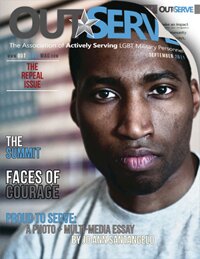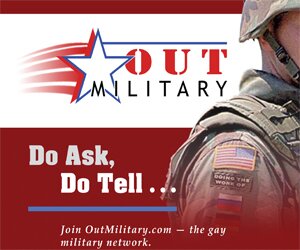The OutHeroes Project: Captain Phil Adams
 As we count down the days to the final end of “Don’t Ask, Don’t Tell,” we are highlighting the contributions of military service members who’ve come before us in this fight for justice. In particular, we are focusing on those whose stories have not been publicized recently, those who many have forgotten – or never knew. This is far from a comprehensive list: it is only a small and random sample of all those who struggled and sacrificed so that gay, lesbian, and bisexual Americans can serve in the military with integrity. But these inspirational stories are solid reminders that LGBT people have served their country, and will continue to serve their country, fiercely and honorably.
As we count down the days to the final end of “Don’t Ask, Don’t Tell,” we are highlighting the contributions of military service members who’ve come before us in this fight for justice. In particular, we are focusing on those whose stories have not been publicized recently, those who many have forgotten – or never knew. This is far from a comprehensive list: it is only a small and random sample of all those who struggled and sacrificed so that gay, lesbian, and bisexual Americans can serve in the military with integrity. But these inspirational stories are solid reminders that LGBT people have served their country, and will continue to serve their country, fiercely and honorably.
After September 20th, once “Don’t Ask, Don’t Tell” is finally ended, OutHeroes Project will profile currently-serving gay, lesbian, and bisexual soldiers, sailors, airmen, Marines, and Coast Guard members.
—
In Honor and Loving Memory of Captain Phil Adams, USMC
By Tom Carpenter, Esq. and Sue Fulton
 Former Marine Captain Phil Adams, USNA ’83, was a founding member of SAGALA and an early volunteer for SLDN. In his own words, from an article written for HRC:
Former Marine Captain Phil Adams, USNA ’83, was a founding member of SAGALA and an early volunteer for SLDN. In his own words, from an article written for HRC:
I grew up in San Francisco and lived in the Castro before it became known as a gay neighborhood. I entered the U.S. Naval Academy in the summer of 1979 and excelled there. My grades were excellent, and I was busy as captain of my battalion’s crew team. I embraced Christianity as my excuse for why I wasn’t dating girls — further delaying issues regarding my sexuality. I was conflicted about my sexual orientation, my religion, and the military’s and society’s homophobic norms.
I was a second lieutenant at the Marine Basic School in Quantico, Va., when the first significant terrorist attack on Americans took place late in 1983. In just a few months, we would be taking up the torch of freedom from our fellow officers — many of whom died in Beirut. In what must have seemed at the time like an act of complete insanity, I volunteered for duty with the Marine infantry. It was tough training but the beginning of a great challenge.
I was assigned to the 1st Battalion, 7th Marines and met 3rd Platoon, Company A at the Marine Corps Mountain Warfare Training Center. There are few greater challenges for a young second lieutenant than to meet his rifle platoon for the first time in the field. I was very demanding — perhaps too demanding — at first. We were living in snow caves and traversing mountains with snow shoes. Over time, my Marines learned that I demanded more of myself than I required of them.
At this early point in my career, a young Hispanic Marine from another platoon “came out” as gay to a chaplain. I watched the chain of events that took place very carefully. It confirmed my views about Marine leadership. This young man was afraid that if his peers found out that he was gay they would beat him up — maybe even kill him. Nothing was further from the truth. The first sergeant took time to speak with the young man and find out what he was all about. His company mates looked out for him and took care of him until he was discharged. There was never any discussion about his shower or living arrangements. We Marines were all brothers and the first sergeant made sure everyone understood that. Leadership creates the mindset of an organization, and the leadership in my unit set the standard.
At one point during our training at the amphibious base in Coronado, Calif., my Marines played a joke on me. At mail call, I received a plain manila envelope and opened it — revealing the contents to all present. Inside was a gay erotic magazine, which my Marines admitted they had sent. It was certainly funny to them, and it was their way of communicating to me their sense that they knew I was gay. It never affected our relationship.
In fact, everything we seemed to touch turned to gold. We were chosen to lead the battalion on tactical operations for desert warfare training in 29 Palms, Calif. We practiced hostage evacuation operations, amphibious assaults and chemical warfare exercises. We led the 7th Marine Regiment in barracks inspections and were asked by our battalion commander to represent the battalion as the drilling platoon for the general inspection. And I was selected to lead our company on the advance party to the 3rd Marine Division in Okinawa, arriving a month prior to the battalion’s deployment overseas.
Adams was made a company commander as a first lieutenant, and commanded an infantry company in Korea, then received a second company command at Camp Pendleton.
Like so many, he could not live with the conflict between the ban and the core values of the services, and despite successful command, Adams resigned his commission in 1991.
In April 1993, shortly after the so-called compromise that became known as DADT was signed into law by President Clinton, Adams published a piece entitled “We are Here To Stay” in the Naval Institute Proceedings, the leading professional magazine for the sea services.
Adams went on to become one of the founding members of the Service Academy Gay and Lesbian Association (SAGALA) and was also a member of USNA Out. His mother became a very active member of Parents and Friends of Lesbians and Gays (PFLAG), and he was a frequent speaker at their events, always talking about his experiences at the Academy, as a Marine Officer and as a proud out gay man. Adams was an original volunteer for Servicemembers Legal Defense Network in Los Angeles and worked tirelessly for the repeal of DADT.
In a state of extreme depression over being forced to leave the Corps and never finding satisfaction in a civilian profession, on June 28, 2006, Adams took his own life. He is remembered with fondness and respect. Semper Fi.
Category: OutHeroes








Thanks, Tom, for sharing this story about our good friend Phil.
I was another who was lucky to have met him. Phil was one of four USNA ’83 graduates who became Officers of Marines, and like Phil, all four were superb officers, but reluctantly left the service because of the personal conflict between their values and “Don’t Ask, Don’t Tell.”
As a member of the United States Army who has only served with combat arms units I can appreciate the difficulties that Captain Adams must have certainly felt on the inside. It is with an absolute heavy heart that I finished reading this story and said to myself that this could have been me. It saddens me to know that this man, after everything he had done for his country, did not live to see the fruits of his labor fulfilled.
I am from Baltimore, a heterosexual woman and have always been exposed to gay men and women. I also served in the Marine Corps and befriended males and females in the Corps who had to love in silence. There were a lot of Marines who struggled with their sexuality and I am so happy that servicemembers are free to love whomever they choose openly. Semper Fi….
Phil Adams is the answer to the question, What makes a man? He would be so proud today to find that his efforts served to finally repeal of DADT. I am so proud of Phil as he is a hero and was my best friend. I miss him…
~F. Damion Barela
Damn that hurt, I literally felt a wave of pain go through my body when I reached the end of this article, although I should have seen it coming judging by the title. I will never understand the need we have to degrade other people because they are different, we are all trying to get through this life they best way that we know how, and Captain Adams was doing a very good job of it. My heart goes out to his mom and to all the parents that have lost their children to other people’s ignorance. I hope that DADT will never come back to haunt anyone ever again.